- Home
- Shirlee McCoy
Home Again Page 4
Home Again Read online
Page 4
“Get out,” she responded, all the questions she’d wanted to ask, all the accusations she’d wanted to lob his way, all the recrimination and words she’d held inside for all these months dying as she turned away.
She bumped into Porter as she made her escape. Quickly, because her face was hot and her eyes were hotter, and if she didn’t watch herself, she might start crying from the sheer amount of rage that was coursing through her blood.
Cold morning air cooled her cheeks, the sun glinting off golden grass and the distant river. She had a field to plow and work to do and a life to build that didn’t include Sim.
Everything else might be in shambles, but at least she was free of the albatross that had hung around her neck for nearly ten years.
“Thank God for that,” she said as she ignored Sim’s frantic plea to just give him a minute and strode down the porch stairs, across the yard, and back to the work he’d interrupted.
Chapter Two
So, this was the ex. The one that no man would ever want to be compared to. Clementine’s tone had made that clear. Looking at the guy made it even clearer. Entitled came to mind. Oily. Sniveling.
Unwanted, unnecessary, and out-of-there.
Porter eyed the guy, not bothering to introduce himself. There was no need. One of them was going to leave. It wasn’t going to be him.
He stepped to the side and gestured toward the door.
“I’m pretty sure she told you to go,” he said.
“Who are you?” the guy asked for the second time, his brown eyes set a little too closely together, his hair a little too styled, his goatee a little too well-groomed.
Everything about him was a little too much for Porter.
Or maybe it was just the fact that he’d arrived on Clementine’s doorstep unannounced, walked into her house without permission, and was pretending he belonged there that was troubling. On the heels of a very bad twenty-four hours, Porter wasn’t in the mood to be diplomatic or reasonable. He was in the mood to kick Clementine’s ex to the curb.
But the guy had come for a reason, and Porter was just curious enough to want to find out what it was.
“Porter Bradshaw. My sister-in-law was your landlady.”
“I’m Simeon Galloway. Sunday and I have always gotten along well. I’m sure she wouldn’t be as eager to send me on my way as Clementine seems to be.” He offered a practiced, polished smile that set Porter’s teeth on edge.
“Since Clementine is the one living here, Clementine’s opinion is what matters.”
“My wife—”
“Ex-wife,” Porter corrected.
“She’s a little upset, but she’ll come around. She always does.”
“She asked you to leave, and now I’m telling you to go. It probably isn’t the best idea to keep arguing with me about that.”
“Tell you what,” Simeon said, the smarmy smile still glued to his face. “How about we go to the farmhouse? Have a cup of coffee with Sunday, and see what she has to say?”
“Sunday is in a rehab facility recovering from a car accident.”
“Then how about we discuss it with Matthias? He’s always been a reasonable guy,” he said, completely ignoring what Porter had said about Sunday.
“My brother was killed in the accident that injured Sunday,” Porter said bluntly, the truth still hard to speak, and much much worse to live.
“Matthias is . . . dead?”
“Yes. He passed away a couple of months ago,” Porter said, a hard knot of grief filling his chest just like it always did.
Grief.
Guilt.
Regret.
He should have been around more.
He should have made more of an effort to understand Matt’s dreams and goals, and maybe, he should have helped him achieve them. He’d visited six months before the accident, bringing a gift to the newest member of the family and staying for exactly two days. Just like he always did.
Forty-eight hours wasn’t a lot of time, but it was enough to notice how run-down the farm had looked, how tired Sunday seemed. He’d wanted to ask his brother what was going on, but Matthias had been his normal cheerful self, outlining all his dreams for the land and the house and the kids he and Sunday were raising. It had all sounded great, because Porter had wanted it to. The truth was, he hadn’t wanted to get involved.
He liked his life neat and clean and free from drama.
He pursued emotional and financial independence the way other people pursued love, because those things allowed him to have the uncomplicated lifestyle he craved. Matthias’s life had been messy. In every way a life could be. All a person had had to do was walk in the front door of the farmhouse to know that.
“I’m sorry to hear that,” Simeon said, his voice tinged with just enough sympathy to be believable. “I liked your brother. He was a good guy.”
“He was. Now, how about you give me your keys and head out?”
“Keys?”
“To the house?”
“Right. Sure.” He dug into his pocket, pulled out a key fob, and dropped it into Porter’s hand. “There you are. Keys to the front and back doors.”
“Great. Have a safe trip back to wherever you came from.”
Sim laughed. “I came from Thailand. I’m not going back anytime soon.”
“Good luck finding somewhere to stay.”
“I thought I’d be staying here, but Clementine didn’t exactly give me the warm reception I was hoping for.”
“You’re divorced. What kind of reception did you think you’d get?”
“We were friends before we got married. I figured we’d be friends after. We’re both reasonable people, after all. Or, at least one of us is. Clementine can be a little emotional. As you saw.” He straightened his tie, then shoved his hands into the pockets of his slacks.
“She didn’t seem emotional. She seemed determined to get you to understand that she didn’t want you here.”
“I think you misread the situation, Porter,” he began.
“Good-bye, Simeon.” Porter cut him off, gesturing to the door again, because he hadn’t misread anything. He’d spent most of his childhood listening to his father talk about how senseless his mother was, how stupid, how incapable. He recognized the arrogance behind Simeon’s words, the superiority.
The guy was a jackass.
Probably worse.
Porter would have been happy to inform him of that, but Simeon was already walking out the door, the air around him reeking of cologne and nicotine, his hands still in his pockets, his demeanor relaxed and unfazed. His shoulders were tense, though, his muscles taut.
He was angry.
More than likely, he was used to getting his way.
“Tell Clementine I’ll give her a call,” he said as he climbed into a sporty red car.
Porter didn’t respond.
He watched as Simeon sped away. His mood had been dark when he’d realized Twila had left the house. It was darker now.
This was not how he liked to spend his time.
He liked things organized, planned, and controlled.
This farm in this town in this area of Washington didn’t allow for any of those things. At least, it hadn’t in the short amount of time Porter had been back. If he were smart, he’d pack all six kids up and cart them back to LA. He’d hire a nanny, a housekeeper, and a cook, and he’d go back to work and forget Benevolence, Washington, and all the bad memories he had of it.
Of course, the idea was impractical.
His two-bedroom apartment wasn’t big enough. Even if it had been, he doubted his neighbors would appreciate the noise and chaos six kids brought.
He also doubted the kids would adjust easily or well.
All six of them had been in tenuous and difficult situations before they’d joined the family. They needed stability and consistency. Now more than ever. It would be unfair to drag them away from what they knew because he hated the town he’d grown up in.
Or, at least,
hated what it represented.
The town itself wasn’t bad. Nice people doing nice things. Nice buildings on nice streets. Nice schools. Nice teachers. Nice everything.
Except for the house on the corner of Main and Evergreen. Built by a railroad magnate to impress his East Coast bride, it was as close to a mansion as Benevolence had. Of course, Porter’s father had purchased it when he’d decided to return to his hometown. He’d been a hero—a guy who’d left, made good, and returned. A software developer who’d earned millions, he’d been determined to make sure everyone in Benevolence knew how successful he was.
The house had been part of that.
The beautiful wife and cute kids.
The family that had been as much a possession as the house and everything in it.
Porter scowled.
Walking down memory lane wasn’t improving his mood.
He’d dated a psychologist once who’d told him he had a few unresolved issues related to his childhood.
He had a hell of a lot more than a few.
He could acknowledge that as easily as he could acknowledge his piss-poor mood. He didn’t want kids, didn’t spend time with kids, knew nothing about kids. And yet, somehow, he was supposed to play Mr. Mom for the next one or two weeks.
Sullivan hadn’t given him an exact return date.
He and Rumer were tying the knot and then spending some time in Sullivan’s Portland apartment. Alone. They deserved it, and Porter wasn’t going to begrudge them their break.
But...
He and kids didn’t mix.
At all.
Speaking of kids, they’d be up and moving by now.
He wanted to make it very clear to every single one of them that leaving the house without permission was a felony offense punishable by lockdown—no phones, no television, no computers or electronic devices. Just the four walls of their rooms and plenty of time to contemplate their crimes.
He walked into the field Clementine was plowing, surprised to see a half dozen neat rows cut into the dark soil. She worked hard, and she worked fast. Sullivan had been saying that for weeks. The proof was everywhere—trees pruned, garden soil turned, yards mown. And now this—a field being plowed for eventual planting.
She glanced his way, offering a quick wave. She looked like she belonged there—driving the tractor, her braided hair falling to the middle of her back, loose curls escaping to curve around her ears and across her cheek. If he’d had to guess her occupation, he’d have said she was a homesteader or a farmer. He wouldn’t have guessed a professor and lecturer. She’d also been listed as a storyteller on her university profile page. He could see that—Clementine weaving words and spinning tales.
What he couldn’t see was how she’d ended up married to Simeon. They didn’t seem to fit. The polished preppy professor and the earth-mother farmer.
Not that it was any of his business.
He walked through an old gate and headed up the path that led to the farmhouse. He could see its yellow siding glowing gold with dawn. The yard was quiet. Just like he’d expected it to be. Everything still and peaceful. He walked to the side of the house, eyeing the window Twila had escaped from. She’d closed it and pulled the ladder inside.
First things first—get the ladder before some other kid decided to use it. After that, he’d gather everyone around the kitchen table and explain how things were going to be.
Then, he’d make them breakfast. Eggs, bacon, and oatmeal. Just like his mom had done before she’d gotten sick.
That sounded right, and having a plan was better than not.
He jogged up the stairs to the back door, stepping aside as it swung open.
He expected to see Rosie, carrying a cup of coffee and enjoying her last few minutes of peace before the house erupted into chaos.
Instead, Heavenly scurried out, closing the door softly behind her, using her key to lock it. Everything quiet and surreptitious.
“Going somewhere?” he asked.
She jumped a foot, swinging around to face him, her eyes lined with coal-black makeup that didn’t belong on anyone let alone a girl her age.
“What are you doing out here?” she asked, tugging her skirt down to cover an extra micro-inch of flesh. It was still too short. So was her shirt. He could clearly see the pale skin at her waist. If she’d been his daughter, he’d have pulled her coat closed, buttoned it up to her chin, and told her to march back inside and put on something that covered more than it revealed.
“I asked first.”
She scowled. Of course. “I have choir practice.”
“At seven in the morning on a Saturday?”
She hesitated. “Okay. So, I’m hanging with friends at the diner.”
“I don’t recall giving you permission to do that.”
“Uncle Sullivan said it was okay.”
“I guess he’ll confirm that when I call?”
“It might have been Rumer. She could have been the one who told me.”
“Heavenly, how about we don’t do this?”
“Do what?” she asked, but the fight had already seeped out of her. That was an improvement. The first month after the accident, she’d been carrying a thousand-pound chip on her narrow shoulders. The newest member of the Bradshaw family and the oldest, she’d still been adjusting to life on the farm when Matthias had died. She didn’t like being told what to do. She didn’t like having to help with the younger kids. Mostly, he thought, she didn’t like not being in control of her life.
“Pretend you’re not trying to sneak away.”
“I’m not pretending anything. I told you where I’m going.”
“Told me. Right. Only you’re thirteen, and you don’t get to decide where you’re going and inform me after the fact.”
“Twelve,” she corrected.
“Like I said: you don’t get to decide.”
“Sunday always said I was wise beyond my years and capable of making good decisions.” She settled her hands on her narrow hips, and the skirt rode up her scrawny legs again. The kid needed to eat. She also needed to wear more clothes.
“I’m guessing she said that because you often made bad ones, and she wanted to encourage you to do better.”
Her cheeks went bright pink, and she frowned. “I’m meeting kids from the youth group. They have a stupid prayer meeting every Saturday morning. Matt and Sunday always let me go.”
“If it’s stupid why do you want to?”
“Because I don’t feel like hanging around with a bunch of little kids all day,” she replied. That, at least, sounded like the truth.
“So you’re telling me that a bunch of teenagers willingly wake up early on Saturday morning to go pray at the diner?”
“We eat, too. And the meeting is at eleven, but it’s going to take me a while to walk there. If I get there early enough, I can wash the windows and sweep the sidewalk for extra cash. I do the same at the five and dime. It’s on the same street.”
He knew the diner.
He knew the five and dime.
He’d done just about every odd job he could when he was a kid, trying to earn money to make his escape from his father’s house.
“You’re not planning to run away, are you?” he asked, the gruffness in his voice making Heavenly stiffen.
“Why would I do that?”
“I don’t know, but if that’s why you want to earn money, forget it.”
“I need money for clothes, damnit!” she nearly yelled. “And for coffee when I’m at the prayer meeting. If I’d wanted to run away from this hellhole, I’d be gone already.”
She ran inside and slammed the door, the sound reverberating through his head.
“Looks like that went about as well as your conversation with Twila,” Clementine called out, her voice as surprising as the kernel of worry that had settled in his stomach, the niggling concern that he was about to fail Heavenly and prove to her that adults really were as stupid and uncaring as she suspected.
; “Apparently, I’m really good at pissing off young girls.” He turned and watched as Clementine crossed the yard, her old work boots scuffed and dirty, her khaki pants loose fitting. She’d taken off her jacket and rolled up the cuffs of her oversized cotton shirt. She wasn’t traditionally pretty. She wasn’t beautiful, either, her cheekbones and chin too sharp, her eyes too large. She was taller than average. Curvy beneath her flowing clothes.
Comfortable in her own skin.
Creamy smooth, flawless skin.
He couldn’t help noticing that. Or the way that all the disparate parts that were Clementine came together to make a stunning figure.
“Heavenly is always pissed off,” she said, stopping at the bottom of the stairs. “If that’s any comfort to you.”
“It’s not.”
She laughed. “You’re going to survive this, Porter.”
“And you know this because . . . ?”
“My dad raised fifteen kids. Mostly on his own. He lived to be eighty-six. He’d probably have reached a hundred if he hadn’t smoked like a chimney and drank like a fish.”
“Were you the youngest?”
“And my mother’s only. I spent three weeks every summer traveling the world with her, and the rest of the year living with my father. Which proved to be a good thing when Dad died, and I moved in with Mom. Things might have been awkward if we hadn’t ever spent time together.”
“Sounds like an interesting story,” he said, wanting to ask questions. Lots of them, because he’d known a lot of people during his thirty-two years of life, but he’d never known a college professor who could also plow a field, prune an orchard, and bring a farm back to life.
“Some people might think so. My father was a shaman and a storyteller. Full-blooded Native American. He married his first wife when he was seventeen. They had four kids. She left when he decided to bring home the baby of his mistress.”
“I take it the baby was also his?”
“Of course. His wife wasn’t too keen on raising another woman’s child, so she left. The mistress moved in, and Dad had three more kids with her. He repeated that pattern several times.”
“How did your mom feel about that?”

 Home at Last
Home at Last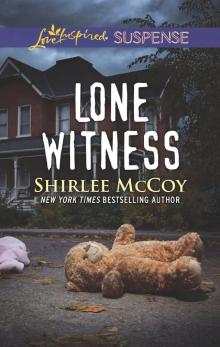 Lone Witness
Lone Witness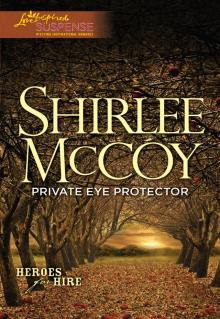 Private Eye Protector
Private Eye Protector Valiant Defender
Valiant Defender Running Scared
Running Scared Dangerous Sanctuary
Dangerous Sanctuary Capitol K-9 Unit Christmas: Protecting VirginiaGuarding Abigail
Capitol K-9 Unit Christmas: Protecting VirginiaGuarding Abigail Hidden Witness
Hidden Witness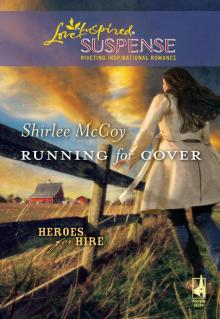 Running for Cover
Running for Cover Gone
Gone Valley of Shadows and Stranger in the Shadows: Valley of ShadowsStranger in the Shadows
Valley of Shadows and Stranger in the Shadows: Valley of ShadowsStranger in the Shadows Home with You
Home with You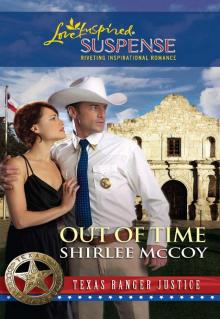 Out of Time
Out of Time Deadly Christmas Secrets
Deadly Christmas Secrets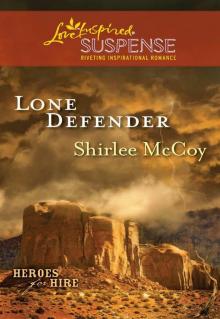 Lone Defender (Love Inspired Suspense)
Lone Defender (Love Inspired Suspense) Home Again
Home Again Die Before Nightfall
Die Before Nightfall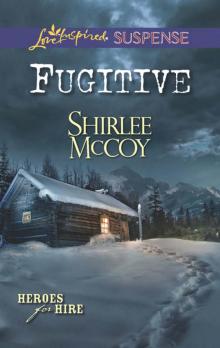 Fugitive
Fugitive Deadly Vows
Deadly Vows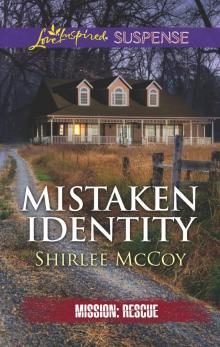 Mistaken Identity
Mistaken Identity Capitol K-9 Unit Christmas
Capitol K-9 Unit Christmas The Christmas Target
The Christmas Target SB01 - The Guardian's Mission
SB01 - The Guardian's Mission Sweet Surprises
Sweet Surprises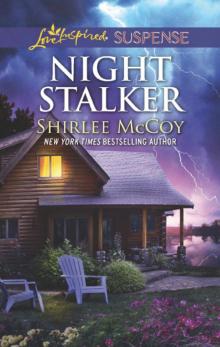 Night Stalker
Night Stalker The Cottage on the Corner
The Cottage on the Corner Love Inspired Suspense January 2014
Love Inspired Suspense January 2014 0373447477 (R)
0373447477 (R) Love Inspired Suspense March 2015 - Box Set 1 of 2: Protection DetailHidden AgendaBroken Silence
Love Inspired Suspense March 2015 - Box Set 1 of 2: Protection DetailHidden AgendaBroken Silence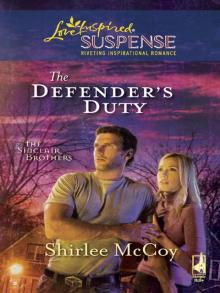 SB03 - The Defender's Duty
SB03 - The Defender's Duty Love Inspired Suspense June 2015 - Box Set 2 of 2: Exit StrategyPaybackCovert Justice
Love Inspired Suspense June 2015 - Box Set 2 of 2: Exit StrategyPaybackCovert Justice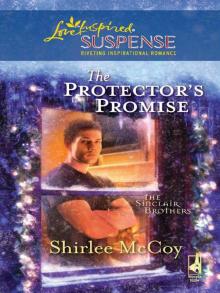 The Protector's Promise (The Sinclair Brothers)
The Protector's Promise (The Sinclair Brothers) Bodyguard
Bodyguard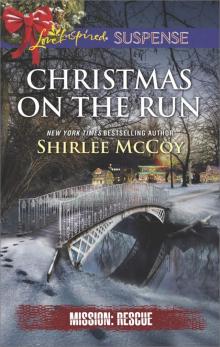 Christmas on the Run
Christmas on the Run The Orchard at the Edge of Town
The Orchard at the Edge of Town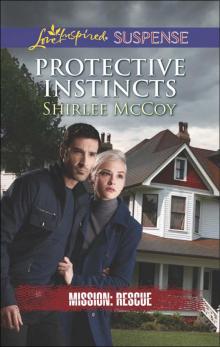 Protective Instincts
Protective Instincts Sweet Haven
Sweet Haven The House on Main Street
The House on Main Street Her Christmas Guardian
Her Christmas Guardian Undercover Bodyguard
Undercover Bodyguard